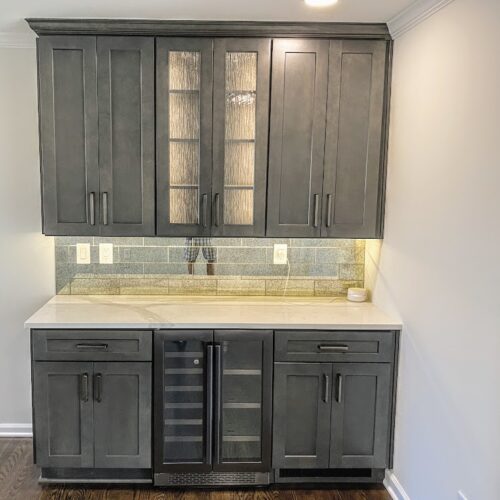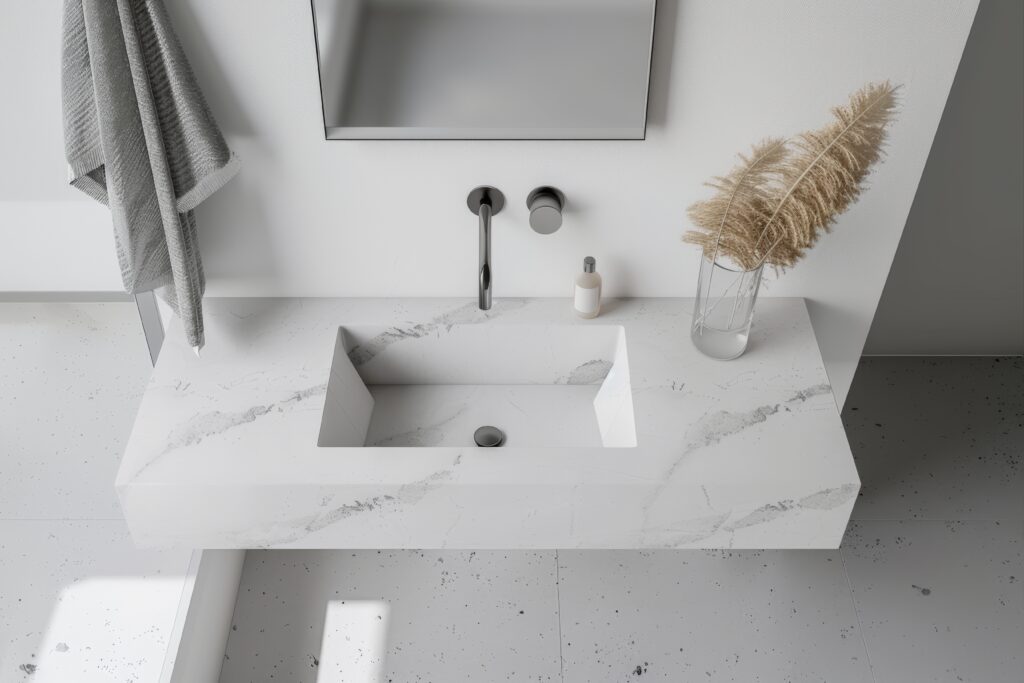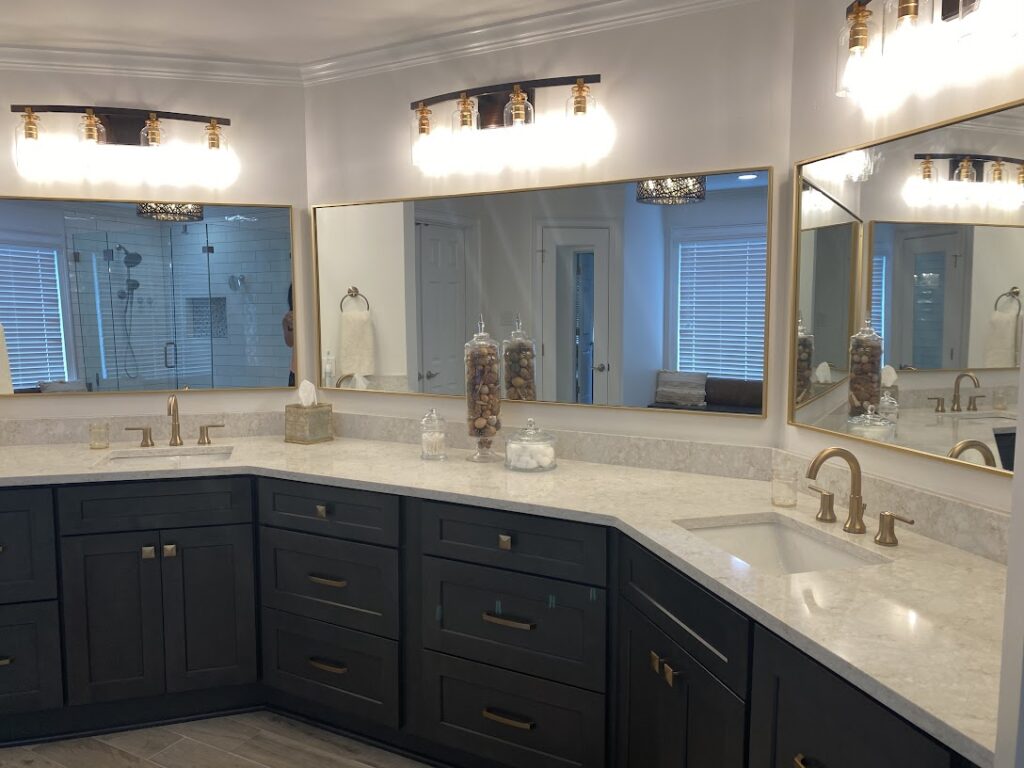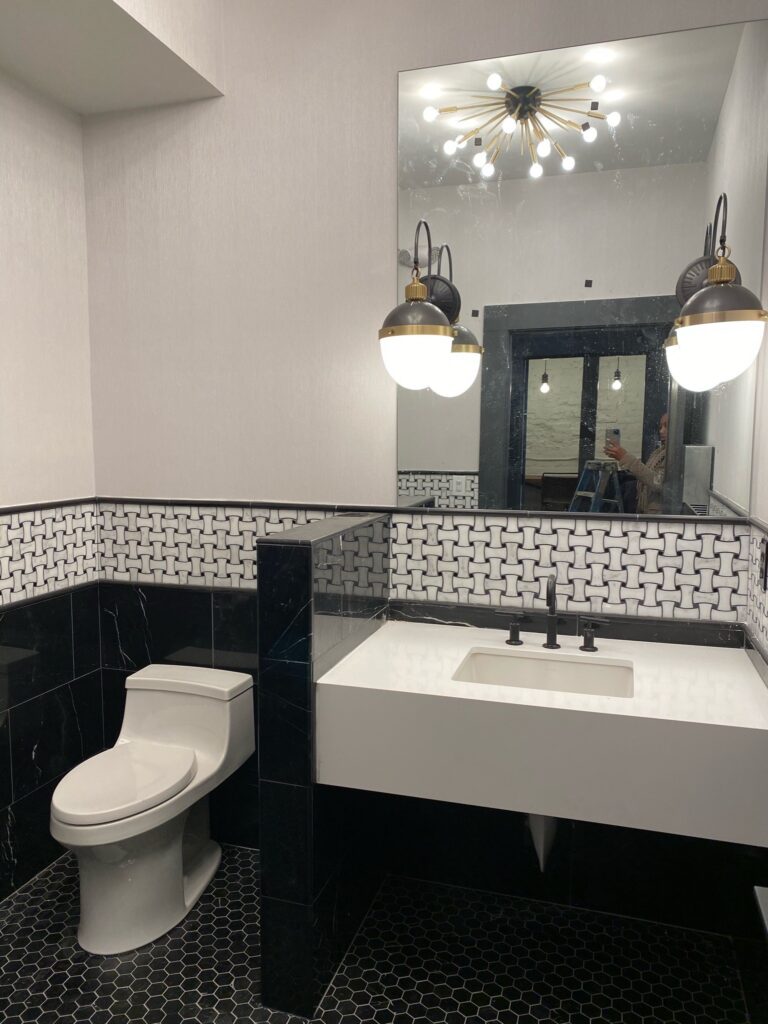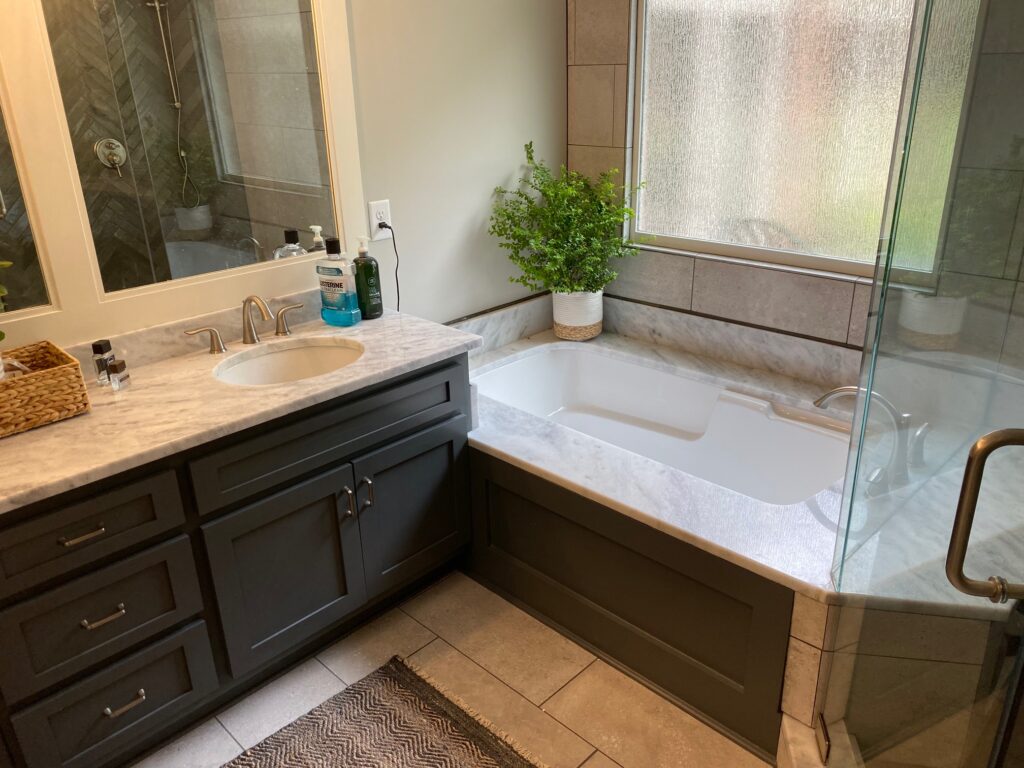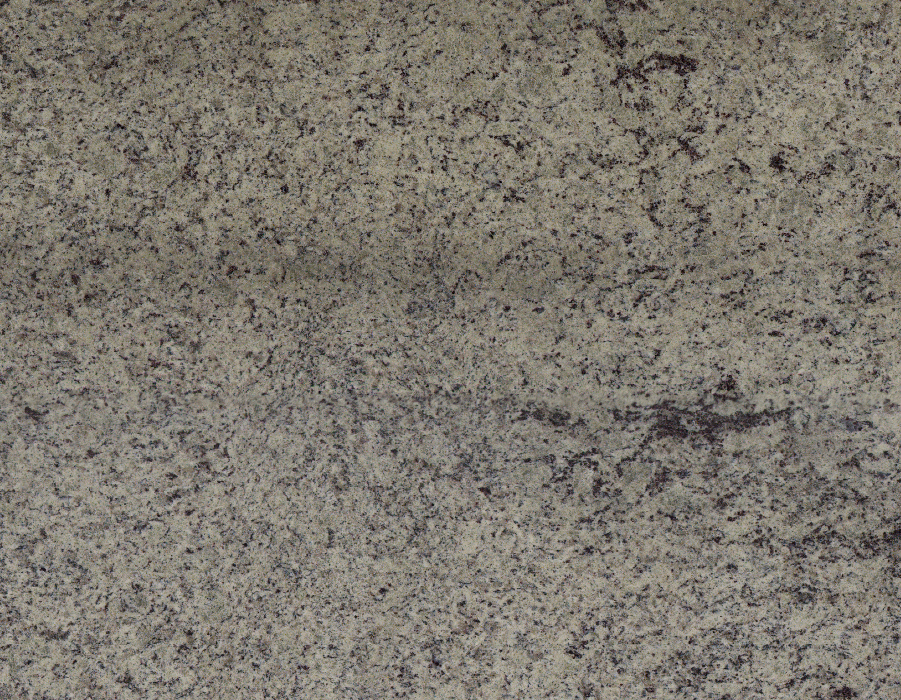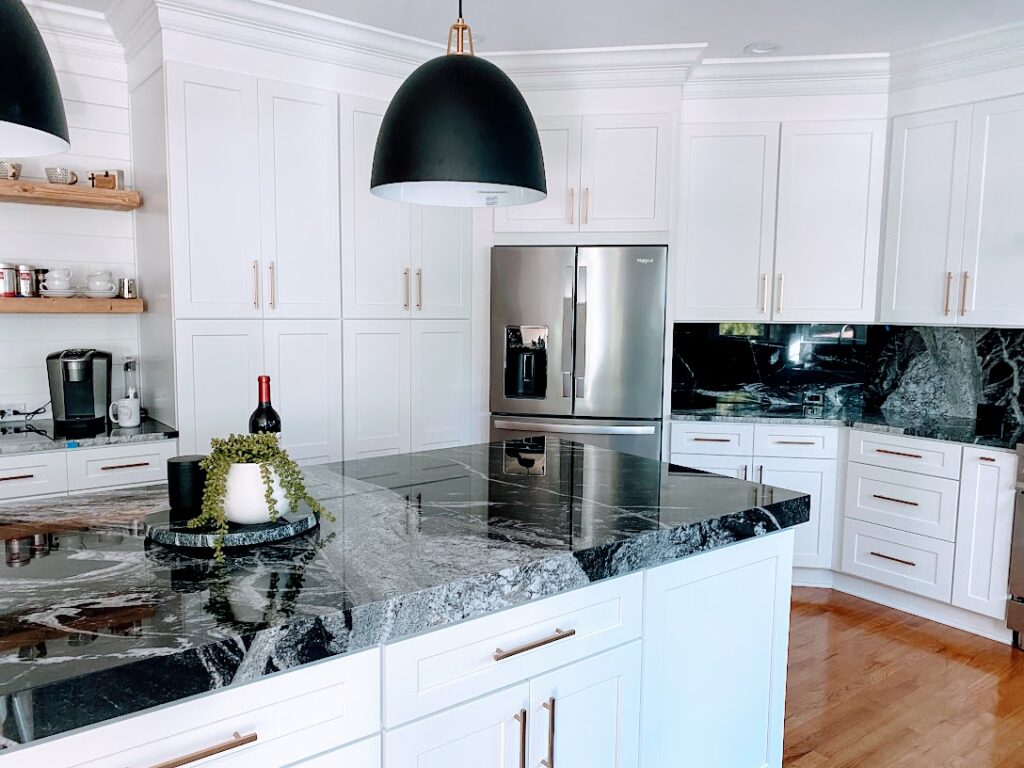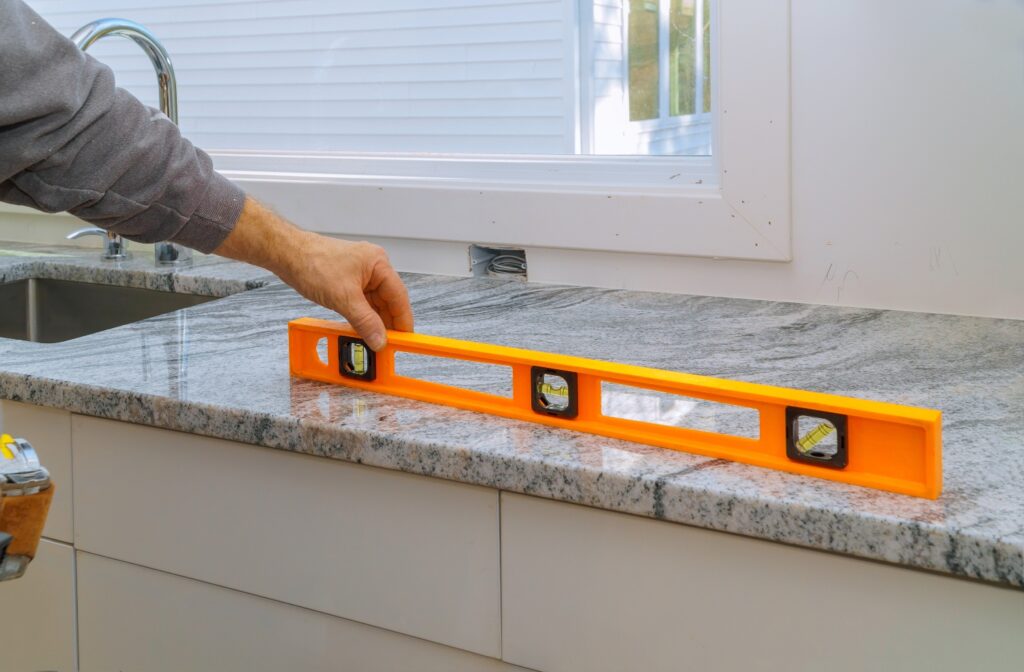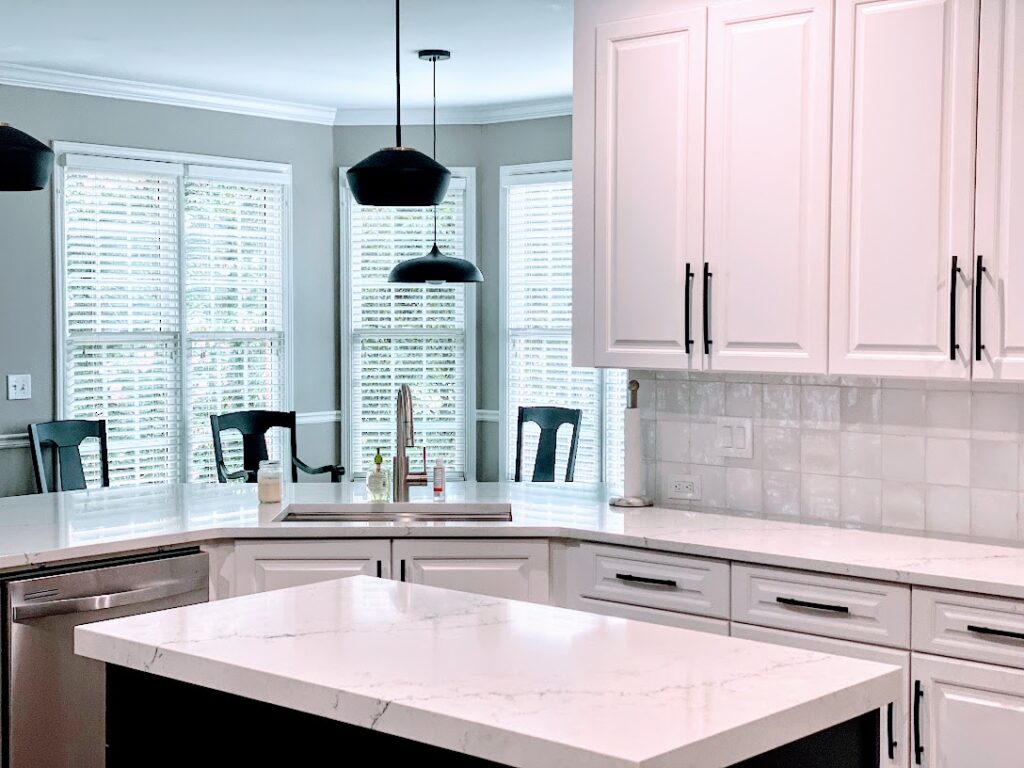Quartz Countertops vs. Tile Countertops
As you weigh the pros and cons of quartz versus tile countertops, it’s crucial to consider the aesthetic appeal and the practicality each option brings to your home. Quartz offers a sleek, low-maintenance surface, ideal for those who value simplicity and modern elegance. On the other hand, tile provides a unique opportunity for creativity and customization with its vast array of colors and patterns. But what about durability and cost? Each material tells its own story regarding long-term performance and investment. So, which one aligns best with your lifestyle needs and budget?
Material Composition and Characteristics
When you’re choosing between quartz and tile countertops, understanding their material composition and characteristics is crucial.
Quartz countertops are engineered surfaces made from natural quartz crystals and resins. This combination results in a non-porous, durable surface that’s resistant to staining and scratching. Quartz is renowned for its uniform appearance and doesn’t require sealing, making it a low-maintenance option. Its resilience against heat and impact is noteworthy, though you should still use trivets and cutting boards to prolong its life.
On the other hand, tile countertops are composed of ceramic or porcelain tiles adhered to a substrate like a cement board. Tiles are typically made from clay fired at high temperatures, resulting in a hard, durable surface. While ceramic tiles are less expensive, porcelain tiles are denser and offer greater durability.
One significant advantage of tile is its heat resistance; you can place hot pots directly on the surface without worry. However, the grout lines between tiles can be susceptible to staining and require regular maintenance, including sealing.
Both quartz and tile offer distinct advantages in terms of their material properties. Quartz provides a seamless surface that is robust and easy to clean.
While tiles offer more flexibility in terms of replacement and repair, they require more upkeep due to grout lines. Considering these characteristics will help you decide which material best suits your lifestyle and maintenance preferences.
Each option provides a unique blend of durability and functionality, so weigh these factors carefully when making your choice.
Aesthetic Appeal and Style Options
Quartz and tile countertops each offer a wide range of aesthetic appeal and style options that can suit various design preferences.
When considering quartz, it offers a sleek, uniform look that appeals to modern and contemporary tastes. Quartz is engineered, meaning you can choose from a vast array of colors and patterns, often mimicking the look of natural stone like marble or granite. It’s perfect if you aim for a seamless appearance since quartz slabs typically have minimal visible seams.
On the other hand, tile countertops allow you to express creativity. Mix and match colors, sizes, and patterns to create a custom design. From classic subway tiles to intricate mosaics, tile offers versatility that quartz can’t match in personalization.
With tile, you can incorporate different textures and finishes to complement your kitchen or bathroom’s overall theme, whether it’s rustic, vintage, or eclectic.
Consider the ambiance you wish to create in your space. Quartz provides a polished, elegant finish that exudes luxury and sophistication. It’s ideal for spaces where a clean, uninterrupted surface is desired.
Meanwhile, depending on your choice of tile design, tile can introduce warmth and character or even a bold statement. It’s an excellent option to add a focal point or a splash of color.
Ultimately, your choice between quartz and tile will depend on your style and the statement you wish your countertops to make in your home.
Durability and Longevity
In terms of durability and longevity, both quartz and tile countertops have their strengths.
Quartz countertops are engineered from a mix of natural quartz and resins, making them incredibly tough and resistant to scratches. You won’t have to worry about everyday wear and tear. They also resist stains and heat, although it’s best to use trivets for hot pots just to be safe. With proper care, quartz countertops can last a lifetime, providing a long-term investment for your kitchen or bathroom.
On the other hand, tile countertops can be equally durable, depending on the type of tile you choose. Ceramic and porcelain tiles are popular for their strength and resistance to heat. They’re less likely to crack under pressure, and you can easily replace individual tiles if they do get damaged.
Tiles are also impervious to water, making them a great choice for wet environments. However, the grout lines between tiles can be a weak point, as they’re prone to staining and may require periodic sealing to maintain their appearance and integrity.
Both options can serve you well when considering longevity, but it’s important to think about how you use your countertops. If you’re looking for a more seamless and low-maintenance surface, quartz might be the way to go.
However, if you appreciate tiles’ versatility and repairability, they may be your better choice. Ultimately, your decision should reflect your lifestyle and the wear and tear your countertops will face over time.
Maintenance and Cleaning
Although both quartz and tile countertops offer distinct advantages, maintaining their pristine condition requires specific care routines.
Quartz countertops are non-porous, making them relatively low-maintenance. To clean them, use mild dish soap and a soft cloth or sponge. You don’t need abrasive cleaners or harsh chemicals which could damage the surface. For stubborn stains, a gentle scrub with baking soda and water paste usually does the trick. Quartz is resistant to most stains, but wiping up spills promptly is best to avoid any potential discoloration.
Tile countertops, on the other hand, require a bit more attention. Regular cleaning with a mild detergent and water keeps the tiles looking fresh. However, the real focus should be on the grout, which can easily harbor dirt and stains. You’ll need to clean the grout lines with a brush and a mixture of baking soda and water or a specially formulated grout cleaner. Sealing the grout every six months helps prevent moisture and dirt buildup, keeping your tile countertop looking its best.
With both countertop types, avoiding direct exposure to heat and using trivets can prevent surface damage. Additionally, use cutting boards to avoid scratches.
While quartz’s non-porous nature makes cleaning a breeze, tile countertops demand more dedication, especially with grout maintenance. Following these simple care routines’ll ensure your countertops stay beautiful and functional for years to come.
Cost Comparison
When comparing costs, both quartz and tile countertops have their own financial considerations. If you’re leaning towards quartz, prepare for a higher initial outlay. This price reflects quartz’s durable, non-porous nature, which offers a consistent appearance and requires less maintenance over time.
On the other hand, tile countertops present a more budget-friendly option. The cost of tile countertops can vary significantly depending on your type of tile. If you’re considering luxury options like hand-painted tiles or natural stone tiles, expect to pay more.
However, while tile countertops might initially seem like the cheaper option, you should consider the long-term costs. Tiles can crack or chip over time, leading to potential repair or replacement expenses. Additionally, grout lines between tiles may require periodic resealing or cleaning to prevent staining or mold growth, adding to maintenance costs.
Quartz countertops, though pricier upfront, can save you money in the long run due to their resilience and low maintenance needs. They’re less likely to suffer damage and don’t require sealing.
Weigh these factors carefully when deciding which countertop fits your budget. Think about your long-term plans for your kitchen or bathroom and choose the option that aligns with both your financial situation and your lifestyle preferences.
Environmental Impact
While cost is a significant factor in choosing countertops, it’s also important to consider their environmental impact. By doing so, you can make a more informed decision that aligns with your values on sustainability.
Let’s dive into how quartz and tile countertops measure up in terms of their ecological footprint.
Quartz countertops are engineered using a mix of natural quartz crystals and resin. The production process involves mining for quartz, which can be resource-intensive and disruptive to ecosystems. However, quartz countertops are incredibly durable and long-lasting. This durability means they don’t need replacing often, reducing the long-term environmental impact.
Additionally, some manufacturers use recycled materials in their quartz countertops, which can lessen the overall ecological footprint.
On the other hand, tile countertops offer a variety of materials, including ceramic, porcelain, and natural stone. Ceramic and porcelain tiles are often made from clay, a readily available and recyclable resource. The firing process requires significant energy, contributing to carbon emissions.
Natural stone tiles, like marble or granite, involve quarrying, which has a substantial environmental impact due to habitat disturbance and high energy use.
However, tile countertops can also be a sustainable choice if you opt for recycled content or locally sourced materials, reducing transportation emissions. Tiles are also easy to repair, meaning you may replace only damaged sections rather than the entire countertop, further minimizing waste.
Ultimately, both options have pros and cons. When weighing the environmental impact of quartz versus tile countertops, consider what matters most to you—durability, the use of recycled materials, or local sourcing.
Installation Process and Complexity
Installing countertops can be a significant undertaking, and understanding the process and complexity involved is crucial for a successful project.
Regarding quartz countertops, the installation process is best left to professionals. Quartz slabs are heavy, and they require precise cutting and fitting. The process typically involves templating, where a template of your countertop is made to ensure a perfect fit.
Once the slab is ready, it must be transported carefully to your home and installed with specialized equipment. Seams must be joined seamlessly, and edges must be polished, requiring expertise.
On the other hand, tile countertops offer a more DIY-friendly option if you’re up for the challenge. The installation involves laying a solid substrate, like a cement board, on which the tiles will be placed.
You’ll need to apply adhesive and carefully set each tile, ensuring they’re level. Grouting follows, filling the gaps between tiles and sealing them. This process can be time-consuming and requires attention to detail, but it allows for customization in design and layout.
While quartz countertops boast a smoother, continuous surface with fewer seams, they require professional handling. Tile countertops offer flexibility and can be done by dedicated DIYers, but they demand precision and patience.
Consider your comfort level with DIY tasks and the time you’re willing to invest. Whether you choose quartz or tile, understanding the installation demands will help you make an informed decision and ensure your new countertop meets your expectations.
Frequently Asked Questions
Do quartz countertops and tile countertops affect home sale values differently?
When considering countertops, focus on how they impact resale value. Buyers appreciate durability and aesthetic appeal. Quartz may attract more due to its sleek look and low maintenance, whereas tile’s versatility might appeal to others. Choose wisely.
Are There Health Concerns Associated With Quartz or Tile Countertops?
Are there health concerns with this countertop? Quartz countertops can emit small amounts of radon, but it’s typically minimal. Tile countertops might harbor bacteria in grout lines. Proper sealing and cleaning reduce these risks.
Can Quartz or Tile Countertops Be Customized for Unique Kitchen Layouts?
You can customize both quartz and tile countertops to fit unique kitchen layouts. Quartz offers seamless installations and various colors, while tiles provide intricate designs and patterns. Choose based on your style preference and desired aesthetic.
How Do Quartz and Tile Countertops Handle Heat and Cooking-Related Stress?
Quartz countertops are more heat-resistant but can be damaged by extreme temperatures. Tile countertops handle heat well, but grout lines might crack over time. Always use trivets or hot pads to protect them.
Are Quartz or Tile Countertops More Prone to Staining From Food and Beverages?
When you’re considering staining, it’s crucial to know the material’s porosity. If it’s porous, it’s more likely to stain from food and drinks. Sealing helps, but regular maintenance is key to keeping surfaces pristine.
Conclusion
When choosing between quartz and tile countertops, consider your priorities. Quartz offers a sleek, uniform look with minimal maintenance, which is ideal for modern designs. It’s durable and resistant to stains and scratches, providing long-term value despite a higher upfront cost. On the other hand, tile offers a wide array of colors and patterns, allowing for personalized style but requires more upkeep due to grout lines. Ultimately, your choice depends on balancing aesthetics, maintenance, and budget.

Val Carvalho is a manager at Atlanta Stone Creations, with nearly two decades of experience in the stone and design industry. In addition to her leadership role, Val plays a key part in sales and design, bringing creativity, precision, and a strong sense of style to every project. Known for her warm and collaborative approach, she builds strong relationships with both her team and her clients. Val is passionate about delivering beautiful, high-quality results and creating an exceptional experience from start to finish.

